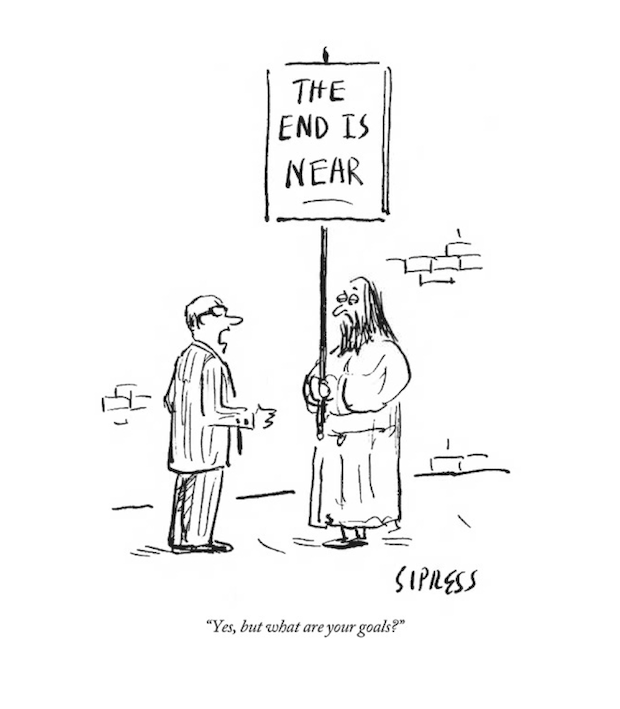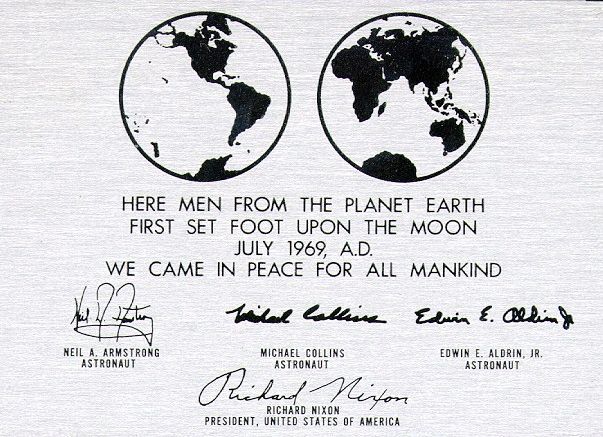
"The important thing is not to stop questioning. Curiosity has its own reason for existing. One cannot help but be in awe when he contemplates the mysteries of eternity, of life, of the marvelous structure of reality. It is enough if one tries merely to comprehend a little of this mystery every day. Never lose a holy curiosity."
"There is no conclusion. What has concluded, that we might conclude in regard to it? There are no fortunes to be told, and there is no advice to be given.--Farewell!"Well, except for the advice to "not stop questioning." And also don't stress about tests. I'd say good luck, but as Mr. Rickey said: "luck is the residue of design."
I hope none of it has been "soul-crushing," and that all my students appreciate the permission our blogging-and-conversing format is designed to convey in reply to "the clarifying question: “Do you mean we can write with the word ‘I’?” Yes you can. You'd better.
And one more thing. An old student recently contacted me to say "your class opened a lot of doors for me. I was inspired by many of the philosophies we explored, but in particular what stood out to me was your identification as an early riser. When I am up at dawn, I feel it is the perfect start to my day, but for the last year I have found it very difficult to get up early, or to get up with a good attitude. I wanted to seek your advise (sic.) on how to improve what I feel is becoming a detrimental habit. Have you always been an early riser? Is this natural for you or are you proactive in techniques?"
Good questions! My response:
I've been an early riser for a long time. The only exception in my adult lifetime, within memory, was when I took a job during Grad School as the Vandy student center's night manager. Had to stay up past midnight, sometimes 'til 2. Then, I didn't tend to get out of bed before 8.
Easiest way to get up at dawn is to bed down by 10:30. That can be hard too, especially for a college student.
Other tips? Don't curtain off the sight and sound of daybreak. When I hear chirping birds and catch a glint of sunlight, I HAVE to get up.
Good coffee or tea waiting for you is a powerful inducement.
It also helps if you have a dog to walk.
And, read Thoreau on the subject:
Every morning was a cheerful invitation to make my life of equal simplicity, and I may say innocence, with Nature herself. I have been as sincere a worshipper of Aurora as the Greeks. I got up early and bathed in the pond; that was a religious exercise, and one of the best things which I did. They say that characters were engraven on the bathing tub of King Tchingthang to this effect: "Renew thyself completely each day; do it again, and again, and forever again." I can understand that. Morning brings back the heroic ages. I was as much affected by the faint hum of a mosquito making its invisible and unimaginable tour through my apartment at earliest dawn, when I was sitting with door and windows open, as I could be by any trumpet that ever sang of fame. It was Homer's requiem; itself an Iliad and Odyssey in the air, singing its own wrath and wanderings. There was something cosmical about it; a standing advertisement, till forbidden, of the everlasting vigor and fertility of the world. The morning, which is the most memorable season of the day, is the awakening hour. Then there is least somnolence in us; and for an hour, at least, some part of us awakes which slumbers all the rest of the day and night. Little is to be expected of that day, if it can be called a day, to which we are not awakened by our Genius, but by the mechanical nudgings of some servitor, are not awakened by our own newly acquired force and aspirations from within, accompanied by the undulations of celestial music, instead of factory bells, and a fragrance filling the air—to a higher life than we fell asleep from; and thus the darkness bear its fruit, and prove itself to be good, no less than the light. That man who does not believe that each day contains an earlier, more sacred, and auroral hour than he has yet profaned, has despaired of life, and is pursuing a descending and darkening way. After a partial cessation of his sensuous life, the soul of man, or its organs rather, are reinvigorated each day, and his Genius tries again what noble life it can make. All memorable events, I should say, transpire in morning time and in a morning atmosphere. The Vedas say, "All intelligences awake with the morning." Poetry and art, and the fairest and most memorable of the actions of men, date from such an hour. All poets and heroes, like Memnon, are the children of Aurora, and emit their music at sunrise. To him whose elastic and vigorous thought keeps pace with the sun, the day is a perpetual morning. It matters not what the clocks say or the attitudes and labors of men. Morning is when I am awake and there is a dawn in me. Moral reform is the effort to throw off sleep. Why is it that men give so poor an account of their day if they have not been slumbering? They are not such poor calculators. If they had not been overcome with drowsiness, they would have performed something. The millions are awake enough for physical labor; but only one in a million is awake enough for effective intellectual exertion, only one in a hundred millions to a poetic or divine life. To be awake is to be alive. I have never yet met a man who was quite awake. How could I have looked him in the face?
We must learn to reawaken and keep ourselves awake, not by mechanical aids, but by an infinite expectation of the dawn, which does not forsake us in our soundest sleep. I know of no more encouraging fact than the unquestionable ability of man to elevate his life by a conscious endeavor. It is something to be able to paint a particular picture, or to carve a statue, and so to make a few objects beautiful; but it is far more glorious to carve and paint the very atmosphere and medium through which we look, which morally we can do. To affect the quality of the day, that is the highest of arts. Every man is tasked to make his life, even in its details, worthy of the contemplation of his most elevated and critical hour. If we refused, or rather used up, such paltry information as we get, the oracles would distinctly inform us how this might be done.
==
What is the pill which will keep us well, serene, contented? Not my or thy great-grandfather's, but our great-grandmother Nature's universal, vegetable, botanic medicines, by which she has kept herself young always, outlived so many old Parrs in her day, and fed her health with their decaying fatness. For my panacea, instead of one of those quack vials of a mixture dipped from Acheron and the Dead Sea, which come out of those long shallow black-schooner looking wagons which we sometimes see made to carry bottles, let me have a draught of undiluted morning air. Morning air! If men will not drink of this at the fountainhead of the day, why, then, we must even bottle up some and sell it in the shops, for the benefit of those who have lost their subscription ticket to morning time in this world. But remember, it will not keep quite till noonday even in the coolest cellar, but drive out the stopples long ere that and follow westward the steps of Aurora. I am no worshipper of Hygeia, who was the daughter of that old herb-doctor Æsculapius, and who is represented on monuments holding a serpent in one hand, and in the other a cup out of which the serpent sometimes drinks; but rather of Hebe, cup-bearer to Jupiter, who was the daughter of Juno and wild lettuce, and who had the power of restoring gods and men to the vigor of youth. She was probably the only thoroughly sound-conditioned, healthy, and robust young lady that ever walked the globe, and wherever she came it was spring.
==
Rise free from care before the dawn, and seek adventures. Let the noon find thee by other lakes, and the night overtake thee everywhere at home. There are no larger fields than these, no worthier games than may here be played. Grow wild according to thy nature, like these sedges and brakes, which will never become English hay. Let the thunder rumble; what if it threaten ruin to farmers' crops? That is not its errand to thee. Take shelter under the cloud, while they flee to carts and sheds. Let not to get a living be thy trade, but thy sport. Enjoy the land, but own it not. Through want of enterprise and faith men are where they are, buying and selling, and spending their lives like serfs.
==
The light which puts out our eyes is darkness to us. Only that day dawns to which we are awake. There is more day to dawn. The sun is but a morning star.
Key point, again: To him whose elastic and vigorous thought keeps pace with the sun, the day is a perpetual morning. It matters not what the clocks say or the attitudes and labors of men. Morning is when I am awake and there is a dawn in me. So, your morning will be whenever there's a dawn in you. Doesn't matter what the clock says, as long as you are really up.
Good luck!
Dearest future earthlings. 
 ...
#earthday #earthlings #kurtvonnegut #futuregenerations #change #vonnegutlibrary #vonnegutreads #indy #planetearth
...
#earthday #earthlings #kurtvonnegut #futuregenerations #change #vonnegutlibrary #vonnegutreads #indy #planetearth

 ...
#earthday #earthlings #kurtvonnegut #futuregenerations #change #vonnegutlibrary #vonnegutreads #indy #planetearth
...
#earthday #earthlings #kurtvonnegut #futuregenerations #change #vonnegutlibrary #vonnegutreads #indy #planetearth



